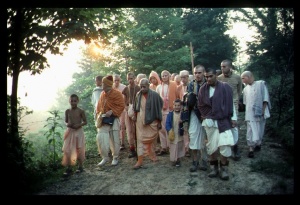CC Madhya 10.114 (1975)

A.C. Bhaktivedanta Swami Prabhupada
TEXT 114
- ataeva svarūpa āge kare parīkṣaṇa
- śuddha haya yadi, prabhure karā'na śravaṇa
SYNONYMS
ataeva—therefore; svarūpa—Svarūpa Dāmodara; āge—at first; kare—does; parīkṣaṇa—examination; śuddha—pure; haya—is; yadi—if; prabhure—unto Lord Śrī Caitanya Mahāprabhu; karā'na—causes; śravaṇa—hearing.
TRANSLATION
It was the practice of Svarūpa Dāmodara Gosvāmī to examine all works of literature to find out whether their conclusions were correct. Only then would he allow them to be heard by Śrī Caitanya Mahāprabhu.
PURPORT
Śrīla Bhaktisiddhānta Sarasvatī Ṭhākura says that if something impedes the execution of devotional service, it should be understood to be impure. Pure devotees of the Lord do not accept impure principles. Impure devotees accept rasābhāsa, or overlapping, contradictory mellows, and other principles opposed to the bhakti path. The followers of such impure principles are never accepted as pure devotees. There are many parties following the path of rasābhāsa, and the followers are sometimes adored by ordinary men. Those who adopt the conclusions of rasābhāsa and bhakti-siddhānta-viruddha are never accepted as devotees of Śrī Caitanya Mahāprabhu. Svarūpa Dāmodara Gosvāmī never approved such followers as Gauḍīya Vaiṣṇavas, nor did he allow them even to meet the Supreme Lord, Śrī Caitanya Mahāprabhu.